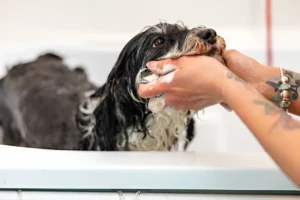Recognizing Your Dog’s Anxiety: Why My Dog is Constantly Scratching and Biting Himself?
First of all
Are you looking for “Why My Dog Is Constantly Scratching And Biting Himself” then you come to the right place.
Imagine your best friend, who is uncomfortable, biting and itching himself all the time. It is a disturbing sight for any owner of a dog. However, why does this occur? We’ll go over the numerous causes of this behavior in this in-depth guide, along with suggestions for how you may support your cat.
Recognizing the Behavior: Appropriate vs Overzealous Scratching
It’s important to distinguish between typical grooming behaviors and excessive scratching in dogs. Dogs will naturally bite and scratch themselves occasionally as a part of their grooming ritual. They can shed dead skin and hair and keep their coat in good condition thanks to this behavior.
But it gets problematic when the biting and scratching happen more frequently and intensely. Over-scratching can result in secondary infections, hair loss, and skin damage. It’s often a dog’s attempt to ease discomfort. It’s time to look into if your dog seems to be scratching more than normal, especially if they seem unable to stop or are injuring their skin.
6 Reasons Why Dogs Scratch
Scratching is a complex problem in dogs, which means that in addition to skin-related issues, other causes may be remote in time. These are a handful of the most common explanations.
Dry Skin
As you become more experienced with raising puppies, you may discover that many of our illnesses can also affect your dog. Dry skin may have a major negative impact on your pet, causing things like dandruff and more fragile, broken skin. Dogs with dry skin frequently experience pain when they are petted, which irritates them and makes them want to scratch, which only makes the situation worse.
Food allergies or environmental factors may be the cause of dry skin. Regretfully, when it comes to meeting your dog’s nutritional needs, the majority of pet meals purchased in stores are not the best. A lack of nutritional support results from the removal of natural oils from many kinds of dog food, which are often good for the skin and fur health of your pet.
Allergies

Your dog may experience allergies, just like we people do, and it happens more frequently than you may imagine. Our dogs may suffer greatly if they have an allergy, suffering from runny noses, red eyes, and itching. Your dog may get agitated and uncomfortable when an allergy hits their skin, which may lead to severe itching and scratching.
If your dog persists in scratching, it is your responsibility to investigate the source as there are numerous possible causes for their discomfort. After taking your furry buddy for a long walk, you could notice that they become more sensitive to the surroundings, such as pollen, grass, or other pollutants. An allergy may be indicated by this.
Occasionally, the allergy may originate from a particular meat or your own house. Certain dogs may react adversely to air fresheners with strong scents or to your cleaning supplies. The three most prevalent types of allergies are environmental, dietary, and parasitic (fleas and mites). By using a hypoallergenic diet trial or parasite prevention, your veterinarian can assist you in finding out what your dog might be allergic to.
Infection
Your dog may have an infection in their ears or on their skin, which could be the cause of their self-destructive behavior of biting and scratching. Although your dog may also have this kind of infection elsewhere on their body, it is very usual to discover that they have a yeast infection in their ear canal.
It’s quite easy to identify a yeast infection. Usually, it is accompanied by crusted skin, swelling, or redness, as well as an unpleasant stench coming from the affected area. Occasionally, brown or yellow discharge mixed with blood seeping from the affected area may also be present, depending on the severity of the infection. If so, a veterinarian will need to help you since the infection needs to be treated.
Fleas
Upon noticing your dog itching, fleas probably come to mind first, right? That being said, we at Doggy Haven advise inspecting their fur first and using a flea preventative all year long. If fleas are the culprit, you might see tiny black droppings that resemble tiny peppercorns. If it’s just a straightforward flea infestation, it should be easy to treat and short-lived.
If your dog continues to scratch, you will need to look into the matter more if there are no indications of fleas or ticks. There are several possible causes for your dog’s itchy skin and low-quality fur, and none of them involve fleas or ticks. Although it’s best to see your veterinarian, there are a few things you can try at home to see if your dog’s irritation could be the source of it.
Unfortunately, when it comes to meeting your dog’s nutritional needs, cheap, low-quality diets are not the best. Low-quality diets have fewer of all the excellent things that are generally helpful for the condition of your dog’s skin and fur, leaving them without enough nutrients. We firmly believe that to ensure that your pet’s nutritional health is at the highest level possible, it is worth investing a little more time and money in research.
Hormonal Imbalances
Unbalanced hormone levels can weaken a dog’s defenses and increase the risk of superficial skin diseases. The most frequent hormonal reasons are hyperadrenocorticism, or excessive cortisol production, and hypothyroidism, or absence of thyroid hormones.
There will be a wide range of indications and symptoms in conjunction with skin changes and frequent scratching in both situations.
Genetic Disorders
Genetic problems are caused by generations of inbreeding, and excessive scratching is one of their symptoms. For instance, syringomyelia, a hereditary disorder, affects more than 70% of Cavalier King Charles Spaniels. The primary cause is damage to the nerve fibers in the spinal cord, however, it typically results in feelings on the skin that range from crawling to burning and present as excessive scratching.
How I Help My Dog
Examine Their Nutrition
If your dog is constantly scratching, you may be able to solve the problem by just altering the food that they receive. If you are aware that your dog is experiencing an allergic reaction to food, you may be able to assist them by switching to a hypoallergenic diet or a sensitive skin and stomach diet. If your dog is eating low-quality food, consider spending more money on a more nutrient-dense brand to provide them with the vitamins and oils they require to maintain healthy skin and coats. If you choose to try changing your diet, keep in mind that you should do so gradually over two weeks.
Bath Them

Keeping up with your dog’s grooming will help alleviate skin irritations, as poor hygiene can exacerbate existing conditions. Regular brushing will aid in distributing all of their natural oils throughout their body. Plus, if you give your dog regular baths, you’ll notice any changes to their skin and fur, which will help you spot issues early on before they worsen and become more serious health concerns.
Though everyday shampooing is not recommended, take care not to over-wash your dogs because they do require their natural oils to protect their skin. Naturally, the requirements for your dog’s coat will vary based on the breed.
Sort Their Environment
As previously indicated, it makes sense to adjust or get rid of anything in your home if your dog is scratching because of it. Fertilizers and pesticides might agitate your dog’s fur when they play in the grass, so try to avoid using them in your backyard as well.
Present Them With Specific Supplements
Enhancing your pet’s nutrition with a supplement can significantly reduce their biting and scratching behaviors. A supplement that targets specific chemicals to ease itching can assist promote a reduction in overall itching, which can help improve the health of your dog’s skin and coat. Look for one from a respected, specialty pet company.
Increase the Omega Content of Your Dog’s Diet
Because of their inherent anti-inflammatory qualities, omega-3 fatty acids can provide a great deal of relief for dogs with itchy skin. Antihistamines may become unnecessary in some circumstances if omega fatty acids are used. Omegas will benefit your dog more than just itching; they will aid on many levels.
Fish oil is the finest source of omegas for dogs. Select fish oil that is always derived from cold-water, wild fish, such as mackerel or salmon. The manufacturer will supply the dose parameters, which are based on the size of your dog.
Consult your veterinarian without holding back if you have any doubts about using fish oil. Remember that fish oil has calories as well. You would need to account for the calories in the oil when calculating your dog’s daily calorie intake if they are following a certain diet.
Use *Prescription* Medications
Here, the emphasis is on the term prescription, indicating that your veterinarian must approve and oversee the decision to medication your dog.
The veterinarian will assess the whole scenario and suggest the appropriate medications for your dog’s particular condition. For instance, a dog suffering from allergies requires corticosteroids and antihistamines, whereas a dog with skin infections requires topical medications and antibiotics.
Remember that certain medications simply treat the symptoms rather than the underlying problem. In addition, prolonged usage of some drugs may result in negative side effects.
Seek Veterinary Care
So why My dog is constantly scratching and biting himself? As can be observed, several conditions can lead to excessive scratching in dogs, the most typical ones being dry skin and negative food reactions. Allergies to the environment and external parasites, however, are not far behind.
The bad news is that your dog will find inflamed, itchy skin bothersome and uncomfortable, so you should get them checked out right away. The good news is that most causes of itchy skin are treatable once identified correctly and do not pose a serious risk to life.
In conclusion, give your favorite veterinarian a call and make an appointment if your dog is waking up in the middle of the night to itch, licking its paws to the point of developing skin sores, or is preoccupied with biting his tail.
Conclusion
In summary, it’s time for intervention if your dog is self-biting and scratching excessively. Physical health problems, environmental circumstances, psychological stressors, and more can all be contributing factors.
You can greatly enhance your dog’s quality of life by being aware of these underlying causes, putting expert treatment, behavioral training, home care, and community assistance into practice, and more. tell us how our guide “ My Dog Is Constantly Scratching And Biting Himself ”
Never forget that the secret to ensuring your dog has a comfortable and happy life is to provide a holistic approach that takes into account both physical and emotional well-being. Stay your dog happy!
